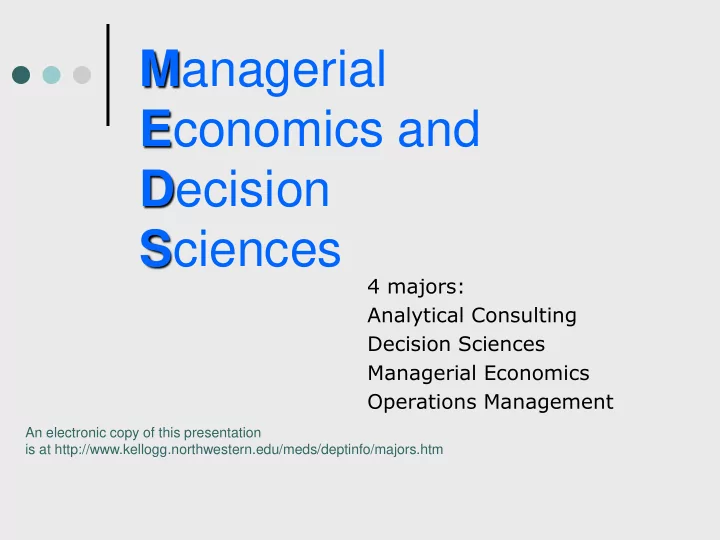

M anagerial E conomics and D ecision S ciences 4 majors: Analytical Consulting Decision Sciences Managerial Economics Operations Management An electronic copy of this presentation is at http://www.kellogg.northwestern.edu/meds/deptinfo/majors.htm
Analytical Consulting A quantitative, analytical approach to strategic managerial consulting In recent years, a significant fraction of Kellogg graduates accept consulting positions upon graduation. Kellogg faculty are at the forefront of developing analytical models and methods. Courses focus on: quantitative skills (e.g., using statistics, optimization, or simulation methods) analytical frameworks (using formal modeling based on microeconomics and/or game theory) Possible major combinations: Accounting Finance Marketing
Analytical Consulting A quantitative and analytical approach to strategic managerial consulting Decision Frameworks: DECS 450 Decision Analysis MECN 446 Pricing Strategies Students DECS 452 Strategic Decision Making must take four courses, MECN 450 Macroeconomic Analysis for Management including at Analytical Strategy least one MECN 441 Competitive Strategy and Industrial Structure from each category: OPNS 454 Operations Strategy MGMT 452 Strategy & Organization Quantitative Models DECS 415 Analytical Consulting Lab MGMT 469 Empirical Methods In Strategy MKTG 450 Research Methods In Marketing OPNS 450 Spreadsheet Modeling for Managerial Decisions OPNS 455 Logistics and Supply Chain Management
Decision Sciences (DECS) Understanding decision making in dynamic and/or uncertain environments What is decision sciences? Most important decisions are characterized by uncertainty about the future. Moreover, decisions may be made over time ( dynamic ) and their payoffs may depend on what other people do ( strategic interaction ) Decision sciences build analytical frameworks to help you make, understand and communicate about such decisions Decision science techniques have become increasingly important in general consulting, oil and natural gas, automobile, transportation and pharmaceutical companies Grounded in principles of probability, statistics, dynamic processes and game theory
Decision Sciences (DECS) Understanding the dynamic nature of decision making Core classes: DECS 433 and 434 Usually taken in fall and winter quarter Presents the basic framework for decisions under uncertainty, involving probability theory and statistics The prerequisite tools for most other courses at Kellogg Turbo version: DECS 445
Decision Sciences The “Mathematical Toolbox” used to understand the dynamic nature of decision making DECS 445 Turbo Decision Making and Statistics Students are DECS 450 Decision Analysis required to DECS 452 Strategic Decision Making take any three of the OPNS 450 Spreadsheet Modeling for Managerial Decisions following DECS 415 Analytical Consulting Lab courses that are offered: MECN 446 Pricing Strategy MGMT 469 Empirical Methods in Strategy For turbo options, visit www.kellogg.northwestern.edu/meds/deptinfo/waiverinfo.htm
Managerial Economics (MECN) Examining decision-making in management What is managerial economics? Many firms create enormous amounts of economic value, yet they still fail in achieving sustained profitability Managerial economics builds a framework that analyzes the creation and distribution of value in the market place Managerial economics analyzes the interaction of fundamentals (demand, cost, nature of competition, and government policies) that determine prices, market size and share Grounded in principles of microeconomics and game theory
Managerial Economics (MECN) Examining decision-making in management Core class: MECN 430 Usually taken in the winter or spring quarter, sometimes fall. Presents the basic microeconomic/game theoretic framework for the analysis of perfect competition, oligopoly and monopoly A prerequisite for many management, strategy and finance courses that build on the basic microeconomic paradigm
Managerial Economics (MECN) Examining decision-making in management The managerial economics major: Key analytical tools serving both industry-based and function-based careers. Especially suited for careers in management consulting Includes demand and cost analysis, pricing strategies, market structures, incentives and information, and game theory
Managerial Economics Examining decision-making in management MECN 441 Competitive Strategy & Industrial Structure Students MECN 446 Pricing Strategies MECN 450 Macroeconomic Analysis for Management are required MGMT 452 Strategy & Organization to take three MECN 499 Independent Study of the MGMT 444 Health Care Economics & Strategy following SEEK 470 Public Economics for Business Leaders courses, at MGMT 441 Intellectual Capital Management least two of which must be MECN courses: For waiver information, visit www.kellogg.northwestern.edu/meds/deptinfo/waiverinfo.htm
Operations Management (OPNS) Managing the supply chain of processes and resources What is Operations Management? Aside from Marketing and Finance, Operations is one of the three key functions in most organizations Operations is at the heart of any firm's ability to transform inputs into the goods and services that it supplies its customers. • Well-managed ops can provide significant strategic advantage to a firm: Wal-Mart, FedEx, Toyota, etc. • On the other hand, a lack of focus on ops can be a significant barrier to success as demonstrated by many e-commerce firms.
Operations Management (OPNS) Managing the supply chain of processes and resources Core class: OPNS 430 Usually taken in winter or spring quarter Presents an overview of the strategic impact of operations and how to improve processes and supply chains
Operations Management (OPNS) Managing the supply chain of processes and resources The operations major is designed with two specific career paths in mind: consulting and general management. High demand in firms focusing on quality - health services, government, transportation, retail, airlines, insurance, banking and others. Possible major combinations: Finance (operating functions of banks and other financial institutions) Marketing (management of complex inventory- distribution-warehousing systems linking retail, wholesale, and manufacturing)
Operations Management Managing the supply chain of processes and resources OPNS 450 Spreadsheet Modeling for Managerial Decisions Students OPNS 454 Operations Strategy are required OPNS 455 Logistics and Supply Chain Management to take any OPNS 482 Service Operations three of the OPNS 499 Independent Study following courses that DECS 415 Analytical Consulting Lab are offered: Or any 900 level OPNS course For more information, visit the operations website: www.kellogg.northwestern.edu/research/operations
Recommend
More recommend